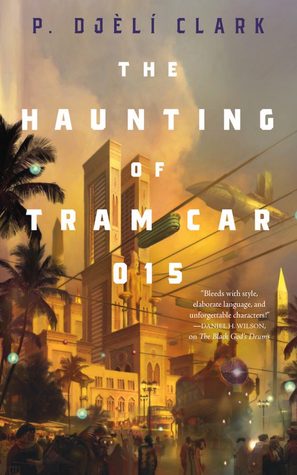- The Good: Rich world of ghosts and djinn, set in an alternate Cairo
- The Bad: Light and fun, there’s not much to complain about here
- The Literary: Middle-eastern folklore abounds
Seasoned agent Hamed al-Nasr of the Ministry of Alchemy, Enchantments and Supernatural Entities investigates a possessed tram car, but he’s fairly certain it isn’t a ghost. In an alternate Cairo around 1912 or so, it’s much more common to encounter lesser djinn, ever since the portal between our world and the land of the djinn was opened. The investigation takes Agent Hamed and his new and enthusiastic partner Agent Onsi around the city as the women of Egypt publicly advocate for the right to vote.
The Haunting of Tram Car 015 is the second novella in the alternate world of Cairo, but the worldbuilding is so complete I didn’t suffer for not reading it’s predecessor. Otherwordly beings are more commonplace, if not entirely accepted, as well as human-built automatons on the verge of recognizing their own sentience. But that’s probably the next story, as this one features a parallel story line of women’s voting rights that comes together exceptionally well at the end.
I love the relationship between Agent Hamid and his young partner Onsi. Hamid is bemused, irritated, and maybe even slightly jealous of Onsi, but he’s an encouraging mentor, surprised by Onsi’s willingness to throw himself into the job. Hamid feels real, like an older gentleman who has seen a lot in his day, describes himself as progressive, especially when it comes to women’s rights, but is still shocked by a young waitress’ outfit or the idea of giving robots personhood.
This is my first reading of Clark, and I find his writing style quietly engaging. Haunting has fantastic worldbuilding, women who read as real people, and nods to issues of inequality alongside a fun plot of detective exorcism.
Recommended for fans of fantasy investigations!
